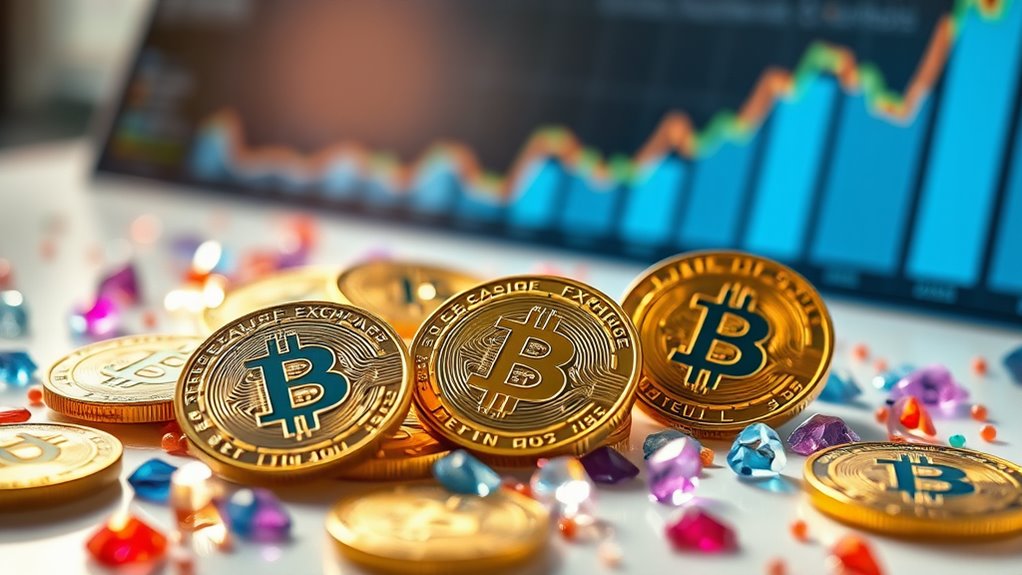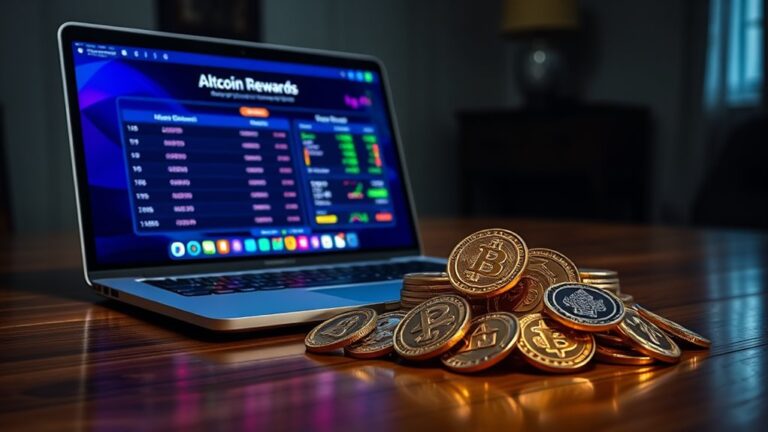
Decentralized Exchange Tokens: What Are Their Benefits?
Decentralized exchange tokens present numerous benefits, such as increasing diversification opportunities for investors through a wide array of cryptocurrencies. They offer cost savings via reduced transaction fees and direct trades, enhancing profitability. Token holders can influence platform decisions, guaranteeing companies are user-centered. Enhanced security features, like smart contracts, guarantee trust and transparency in operations. These tokens are pivotal for linking digital assets with traditional finance, paving the way for future developments in this evolving ecosystem. Explore this dynamic investment avenue.
Key Takeaways
- Decentralized exchange tokens enable investors to diversify portfolios, reducing risk across various cryptocurrencies and blockchain networks.
- Lower transaction fees and wallet-to-wallet trades in DEXs offer users significant cost savings compared to centralized exchanges.
- Governance tokens empower users to participate in decision-making, fostering community engagement and platform development.
- Enhanced security features, like non-custodial wallets and smart contracts, ensure trustless and secure transactions on DEXs.
- Incentives such as staking rewards and discounted fees motivate active participation and investment in decentralized exchange platforms.
Diversification Opportunities for Investors

Decentralized exchange tokens offer an array of diversification opportunities for investors by providing access to a wide range of cryptocurrencies, including niche and emerging tokens often unavailable on centralized platforms. This access aids in distributing risk across multiple assets, thereby reducing concentration risk. Investors benefit from the flexibility to craft dynamic portfolios that can swiftly respond to market shifts. Multi-chain decentralized exchanges further enhance liquidity, granting entry to tokens across various blockchain networks. These exchanges can include tokens that fall into different categories such as utility tokens or stablecoins, broadening investment opportunities. Diversification extends across different blockchain sectors, offering extensive exposure to industry trends. By incorporating assets with varying risk profiles, diversification helps manage portfolio volatility, avoiding over-reliance on more familiar assets like Bitcoin and Ethereum. Ultimately, this strategy maximizes returns while maintaining a balanced risk level.
Potential for Growth and Value Appreciation

As decentralized exchanges gain traction through increased blockchain adoption on platforms like Ethereum and Solana, their market share has expanded, reaching about 20% of centralized exchange volumes. This growth is further propelled by innovation within the DEX ecosystem, introducing financial products like yield farming. Another driving factor is the interest from large investors, known as whales, who view tokens like Uniswap and PancakeSwap as promising assets, contributing to price stability and appreciation. Their involvement shifts market sentiment positively, reinforcing confidence. Additionally, robust trading volumes on platforms such as dYdX enhance liquidity, attracting more traders and new tokens. These elements collectively foster a dynamic environment for DEX token appreciation. Moreover, the integration of altcoins with traditional financial systems is likely to encourage further mainstream acceptance, boosting the overall value of DEX tokens in the market.
Lower Transaction Fees and Cost Savings

Decentralized exchanges often offer reduced transaction fees and cost savings compared to their centralized counterparts, highlighting efficient fee reduction mechanisms.
By allowing direct wallet-to-wallet trades without intermediaries, DEXs minimize additional charges, and users can exercise control over their transaction fees to balance speed and cost.
In addition, the use of advanced technologies like gas tokens and Layer 2 solutions helps optimize fee structures, enabling cost efficiency while maintaining secure and transparent trading environments.
Fee Reduction Mechanism
To achieve lower transaction fees and cost savings, the utilization of decentralized exchange tokens proves instrumental by implementing various fee reduction mechanisms. Tokens facilitate trading on blockchains with lower fees, like Binance Smart Chain or Solana, thereby reducing costs. Smart gas fee management enables users to adjust fees strategically, while gas refund mechanisms further decrease overall transaction costs. Additionally, employing Layer 2 solutions such as Optimism or Arbitrum can significantly diminish fees. Understanding cryptocurrency exchanges is essential for traders to effectively navigate these cost-saving measures and make informed decisions.
| Feature | Benefit | Example Implementation |
|---|---|---|
| Blockchain Choice | Lower inherent transaction fees | Binance Smart Chain |
| Smart Gas Fee Management | Strategic fee adjustments | User-controlled settings |
| Gas Refund Mechanisms | Reduce transaction costs | Refund initiatives |
| Usage of Layer 2 Solutions | Significant fee reduction | Optimism, Arbitrum |
Cost Efficiency Benefits
Lower transaction fees and cost savings are significant advantages offered by decentralized exchange tokens. Decentralized exchanges (DEXs) often have lower trading fees because they operate without intermediaries, reducing costs for users.
Additionally, DEXs use a peer-to-peer trading model, eliminating custodial fees. The use of gas tokens enhances cost efficiency by allowing users to mint and store gas at low prices. This hedging strategy minimizes the impact of volatile gas prices, especially during high network congestion.
By strategically managing gas token usage, users can optimize transaction costs, achieving long-term savings. The decentralized infrastructure further cuts costs by reducing reliance on expensive infrastructure and lowering maintenance expenses.
As a result, users benefit from efficient asset management and streamlined operations.
Governance Rights and Community Participation

Governance tokens on decentralized exchanges empower users by granting them the ability to influence key platform decisions through voting. This system guarantees that voting power typically corresponds to the number of tokens held, promoting active community-driven governance. These tokens play a crucial role in shaping platform development and fostering democratic decision-making within blockchain protocols.
Platform Decision Influence
Although decentralized exchanges are renowned for bypassing traditional financial intermediaries, their true power lies in the hands of those who hold governance tokens, allowing for community participation and influence over platform decisions. Governance tokens empower users to engage in decentralized decision-making, making the processes more transparent and accountable. This form of community engagement fosters ownership and incentivizes participants to regard the platform's well-being when making decisions. The role of Decentralized Autonomous Organizations (DAOs) underscores the significance of governance tokens in enabling distributed authority. Additionally, this structure guarantees balance, shifting power dynamics from centralized control to community-driven initiatives. Decentralized finance platforms also provide increased accessibility to financial services, democratizing access and allowing wider participation in the global financial system.
| Influence Factors | Description |
|---|---|
| Decentralized Decision-Making | Users participate in decisions |
| Community Engagement | Fosters ownership and responsibility |
| Transparent Processes | Guarantees clear and verified decisions |
Ultimately, such mechanisms prevent centralization and maintain fairness.
User Voting Power
User voting power within decentralized exchange platforms plays a crucial role in governance rights and community participation. Governance tokens empower users to engage actively, giving them real decision-making power in project outcomes. Holding governance tokens allows users to propose changes, vote on project decisions, and guarantee that their interests align with those of the platform.
- Ownership Representation: Governance tokens symbolize ownership, providing holders with a stake in the success of decentralized projects.
- Smart Contract Execution: Voting outcomes are directly implemented through smart contracts, enhancing transparency and trust.
- Delegation and Quadratic Voting: Users can delegate votes or employ quadratic voting models to dilute the dominance of large investors.
- Participation Incentives: Since users benefit from the platform's success, they are motivated to participate actively in governance activities.
Community-Driven Governance
While user voting power underpins governance in decentralized exchange platforms, community-driven governance further emphasizes the collaborative nature of decision-making within these structures. Governance tokens enable decentralized participation, allowing users to engage in decision-making processes. This inclusive model fosters transparency and accountability as processes are recorded on-chain. Token holders are incentivized through staking rewards, encouraging long-term commitment. Community feedback mechanisms guarantee project development aligns with user needs, supporting evolution and innovation. Various governance models, such as delegated governance and DAOs, streamline decision-making by leveraging expertise. These empower community participation, allowing proposals and diverse voting systems to flourish. Consequently, governance tokens offer benefits like alignment with project success and decentralized decision-making.
| Aspect | Description | Benefit |
|---|---|---|
| Decentralized Participation | Users engage in decision-making | Transparency and innovation |
| Incentives | Staking rewards for long-term commitment | Enhanced project loyalty |
| Governance Models | Diverse models streamline decisions | Efficient participation |
Incentives and Rewards for Token Holders

Decentralized exchange tokens offer a range of incentives and rewards for token holders, creating multiple benefits that drive engagement and platform loyalty.
These incentives are designed to foster active involvement and increase the attractiveness of holding such tokens.
- Staking Rewards: Token holders can earn additional tokens by maintaining a balance in their wallets, promoting long-term investment strategies.
- Discounted Trading Fees: Reduced fees for token holders enhance trading profitability, making the platform more appealing to traders.
- Governance Rights: Holding tokens often provides voting rights, allowing users to influence vital platform decisions and policies.
- Token Burns: Some exchanges buy back and burn tokens, potentially increasing token value by reducing the overall supply, benefiting current holders.
These strategies make decentralized exchanges compelling for both new and experienced users.
Security Features and Technological Advantages

Understanding the security features and technological advantages of decentralized exchanges (DEXs) is essential for appreciating their growing importance in the financial landscape.
Decentralized governance through DAOs guarantees transparent operations. Users benefit from non-custodial wallets, providing control over their assets, while smart contracts, audited for security, enable trustless transactions.
Enhanced security features include protection against reentrancy attacks, advanced encryption protocols, and multi-signature authentication, bolstered by regular audits and bug bounty programs.
Technological innovations like Web3 integration and automated market makers (AMMs) improve user interaction and liquidity management.
Cross-chain functionality and decentralized storage solutions, such as IPFS, enhance data security.
Layer 2 scaling solutions address scalability issues without sacrificing security, contributing to a resilient and efficient trading environment.
Well-designed regulations could foster mainstream adoption and sustainable growth in the digital asset ecosystem while protecting consumers and financial systems.
Frequently Asked Questions
How Do DEX Tokens Differ From Regular Cryptocurrencies?
DEX tokens differ from regular cryptocurrencies by offering decentralized governance, liquidity provision incentives, reduced fees, and access to emerging assets. They often serve within specific DEX platforms, enabling efficient trading, liquidity pooling, and enhanced security through blockchain technology.
What Risks Are Associated With Investing in DEX Tokens?
Investing in DEX tokens presents risks including smart contract vulnerabilities, liquidity issues, and regulatory uncertainties. Additionally, impermanent loss, gas fee volatility, and user errors contribute to the overall risk, challenging investors in maintaining security and profitability.
Can DEX Tokens Be Used Across Multiple Platforms?
DEX tokens, the chameleons of the crypto world, traverse various platforms through cross-chain bridges. Their adaptability relies on interoperability between networks, enabling seamless transactions. However, compatibility issues and incomplete network support sometimes hinder their platform versatility.
How Are DEX Tokens Initially Distributed or Launched?
Decentralized exchange tokens are initially distributed through mechanisms like Initial DEX Offerings, Token Generation Events, private sales, and airdrops. These strategies involve smart contracts, vesting schedules, and often require KYC for compliance, ensuring secure, equitable distribution.
What Role Do DEX Tokens Play in Platform Liquidity?
DEX tokens greatly enhance platform liquidity by incentivizing user contributions to liquidity pools, which guarantees seamless, low-slippage trading experiences. By pooling assets, they sustain real-time trading and reward providers with fees, attracting consistent liquidity provision and participation.
Conclusion
Decentralized exchange tokens deliver distinct diversification, offering investors a chance to expand their portfolios. These tokens possess potential for growth, providing prospects for value appreciation over time. With reduced transaction fees, users enjoy cost savings, enhancing economic efficiency. Governance rights grant holders a voice in decision-making, fostering community collaboration. Incentives and rewards further attract participants, boosting engagement. Equipped with robust security features, decentralized tokens combine cutting-edge technology with trust, ensuring safe and streamlined transactions for all involved.














